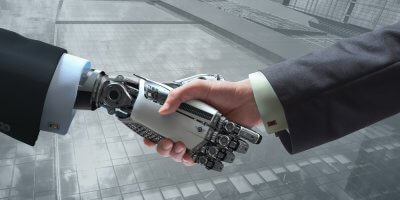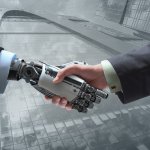
The e-learning industry is set to become even stronger with the help of artificial intelligence. Source: Shutterstock
What can AI do for the future of e-learning?
THE training and development of your workforce is vital to the achievement of digital transformation success for businesses. And today, more and more businesses are leveraging e-learning to educate their employees.
The advantages for businesses using online learning platforms as opposed to traditional training methods are bountiful.
First, it lowers business costs since one training session can be delivered to multiple people.
Second, topics can be broken down into bite-sized chunks, meaning that employees do not need to spend lengthy periods of time away from their desks.
Third, the flexibility of e-learning, with the ability for employees to partake in learning from at home, at their desks, or on the train – is incredible.
Furthermore, with e-learning being made entertaining through gamification, video content, graphics, and so on, there is evidence to suggest that learning success is higher than the traditional classroom model of learning.
According to Forbes, the e-learning industry is set to become even stronger with the help of artificial intelligence (AI). But how exactly?
AI allows for a differentiated curriculum
Traditional training methods are based on a “one size fits all” approach to learning.
Yet, many may say that this is ineffective, considering each and every one of us process content in different ways and at different speeds. One style of learning that may work for one person, may be unsuccessful for the next.
Trying to address this problem is near enough impossible in a classroom with one teacher and limited resources.

When equipped with models of AI, e-learning technology can address points of confusion immediately as they crop up. Source: Shutterstock
But e-learning equipped with intelligence seeks to address this problem, allowing for curriculum which is tailored to each person’s learning style.
For instance, the past history of an online learner may reveal that they prefer tactile e-learning activities.
From this, the system will automatically adjust their learning schedule to include content that is more kinesthetic. And for learners who exhibit a particular skills gap, through AI, they can receive targeted recommendations that build upon their weaknesses.
The result? Employees can soak in the learning content at their own pace and style to ensure optimum understanding of the content.
Real-time AI-driven tutoring
In the traditional model of learning and development, if a student or employee misunderstands some aspect of a lesson, they usually have to wait until the end of the session to clarify it.
This can be a real barrier to learning since it is probable that they would have missed all the content that followed that little moment of misunderstanding.
However, when equipped with models of AI, e-learning technology can address points of confusion immediately as they crop up.
Many e-learning tools incorporate AI systems that process the queries of the learner and responds to them in real-time. This means that employees waste far less time being confused over points and more time learning.
As well as this, e-learning can address points of misunderstanding privately.
In a traditional training session, employees may feel too embarrassed to ask a question they may feel will make them look unintelligent- but this can really complicate the learning process. E-learning courses allow employees to ask questions privately such as on an online forum.
Fresh and relevant study materials
A further area where AI is revolutionizing the e-learning industry is by ensuring that the content being taught is always relevant, accurately reflecting the world the employees are working in.
Artificial intelligence can learn to assess which areas of the training content require updating or removing, and can also direct learners to relevant websites that have updated information.
READ MORE
- Onwards and upwards: China begins to integrate AI into planes
- The role of talent in the journey towards digital
- Digitizing the bank for a better customer experience
- How AI is helping recruiters write the perfect job advert
- Alibaba plans to build Xiongan New Area into an AI ‘smart city’


